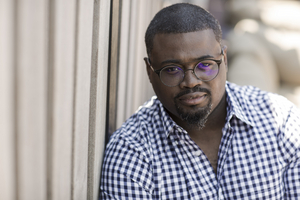Review: RUSSELL THOMAS LIVING ROOM RECITAL
Listen to tenor Russell Thomas and collaborative pianist Kyung-mi Kim s gorgeous Living Room Recital for Los Angeles Opera.

On Monday, August 10, 2020, I listened to tenor Russell Thomas and collaborative pianist Kyung-mi Kim's "Living Room Recital" for Los Angeles Opera. In announcing his program Thomas admitted to being a bit nervous singing to an online audience from his own living room. Nerves completely disappeared when he began to sing with his resonant mid-voice tones. He opened with Franz Schubert's 1817 apotheosis to the art of music, "An die Musik" ("To Music") written to words by Franz von Schober. Thomas and Kim gloried in the song's sweeping melody as the piano's strong bass underscored the vocal line.
Ralph Vaughn Williams' "Let Beauty Awake" from his cycle, Songs of Travel, written between 1901 and 1904, showed us a wanderer who is tired of the world. While Kim played long melodic lines, Thomas maintained a sweet simplicity above it.
Pietro Mascagni's 1890 song, "Risveglio" ("Awakening"), with words by G.E. Ducati, begged the swallow to sing as day dawned. The singer wanted to sing along but the bird's flight had been clipped. Thomas' voice had both the lyricism for a song about birds on a summer morn and the dramatic strength for more passionate fare.
Henri Duparc and Charles Baudelaire's "L'Invitation au voyage" ("Invitation to a Voyage") demanded and received both. Thomas described a utopia where two people could live together in the luxury of harmony and contentment. He created a vivid picture as he told of ships coming from the ends of the earth to gratify his lover's desires while the sun bathed fields, canals, and the town in red and gold.
Thomas mentioned that he loved Giuseppe Verdi's "L'esule" ("The Exile") because it is much like an operatic scene. "The Exile" described a charming background and then confessed that it only made him sad because it reminded him of better times in the place where he had friends and relatives. Exiled from there for life, he longs for death and reunion with his loved ones. Thomas sang about the beautiful place with the lyricism he uses in singing Bellini. He told of his sad situation with the dramatic vocal tones needed for Radames or Manrico. Thomas can send waves of pure tone into the ether and he can draw his voice down to a single thread for effect.
Samuel Barber's 1947 piece, "Knoxville: Summer of 1915," was written for voice and orchestra but we heard it in a piano reduction. It opened with a dreamy nostalgic picture of late afternoon in the city. As Thomas sang with lush tones and Kim played Barber's distinctive harmony, one could almost smell the magnolia blossoms. I hope to hear Thomas sing this work with orchestra at some point.
Published by Abel Meeropol in 1937, "Strange Fruit" protests the lynching of Black Americans by groups of racists. The song has been included on the list of Songs of the Century by the Recording Industry of America and the National Endowment for the Arts. It is a blockbuster and it provided an unforgettable finale to this concert.
Photo of Russell Thomas by Los Angeles Opera.
Reader Reviews
Videos

